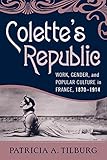Colette's Republic : Work, Gender, and Popular Culture in France, 1870-1914 / Patricia A. Tilburg.
Material type: TextPublisher: New York ; Oxford : Berghahn Books, [2009]Copyright date: ©2009Description: 1 online resource (246 p.)Content type:
TextPublisher: New York ; Oxford : Berghahn Books, [2009]Copyright date: ©2009Description: 1 online resource (246 p.)Content type: - 9781845455712
- 9781845459307
- Education -- Social aspects -- France -- History -- 19th century
- Education -- Social aspects -- France -- History -- 20th century
- Performing arts -- Social aspects -- France -- History -- 19th century
- Performing arts -- Social aspects -- France -- History -- 20th century
- Popular culture -- France -- History -- 19th century
- Popular culture -- France -- History -- 20th century
- Secularism -- France -- History -- 19th century
- Secularism -- France -- History -- 20th century
- Sex role -- France -- History -- 19th century
- Sex role -- France -- History -- 20th century
- HISTORY / Europe / France
- Gender Studies and Sexuality, History: 18th/19th Century, Cultural Studies (General)
- 306.094409034 22
- DC33.6 .T55 2009
- online - DeGruyter
| Item type | Current library | Call number | URL | Status | Notes | Barcode | |
|---|---|---|---|---|---|---|---|
 eBook
eBook
|
Biblioteca "Angelicum" Pont. Univ. S.Tommaso d'Aquino Nuvola online | online - DeGruyter (Browse shelf(Opens below)) | Online access | Not for loan (Accesso limitato) | Accesso per gli utenti autorizzati / Access for authorized users | (dgr)9781845459307 |
Frontmatter -- CONTENTS -- LIST OF FIGURES -- ACKNOWLEDGMENTS -- INTRODUCTION -- 1 “THERE ARE NO FOOLISH MÉTIERS” Work, Class, and Secular Girls’ Education -- 2 “A HEALTHY SOUL IN A HEALTHY BODY” Physical and Moral Education in the Third Republic -- 3 CLAUDINE IN PARIS The Republican School in Memory and Fiction -- 4 EARNING HER BREAD Métier, Performance, and Female Honor, 1906–1913 -- 5 “THE TRIUMPH OF THE FLESH” Women, Physical Culture, and the Nude in the French Music Hall, 1900–1914 -- 6 “THE PEOPLE’S MUSE” Pantomime, Social Art, and the Vie intérieure -- EPILOGUE -- BIBLIOGRAPHY -- INDEX
restricted access online access with authorization star
http://purl.org/coar/access_right/c_16ec
In France’s Third Republic, secularism was, for its adherents, a new faith, a civic religion founded on a rabid belief in progress and the Enlightenment conviction that men (and women) could remake their world. And yet with all of its pragmatic smoothing over of the supernatural edges of Catholicism, the Third Republic engendered its own fantastical ways of seeing by embracing observation, corporeal dynamism, and imaginative introspection. How these republican ideals and the new national education system of the 1870s and 80s - the structure meant to impart these ideals - shaped belle époque popular culture is the focus of this book. The author reassesses the meaning of secularization and offers a cultural history of this period by way of an interrogation of several fraught episodes which, although seemingly disconnected, shared an attachment to the potent moral and aesthetic directives of French republicanism: a village’s battle to secularize its schools, a scandalous novel, a vaudeville hit featuring a nude celebrity, and a craze for female boxing. Beginning with the writer and performer Colette (1873–1954) as a point of entry, this re-evaluation of belle époque popular culture probes the startling connections between republican values of labor and physical health on the one hand, and the cultural innovations of the decades preceding World War I on the other.
Mode of access: Internet via World Wide Web.
In English.
Description based on online resource; title from PDF title page (publisher's Web site, viewed 25. Jun 2024)


